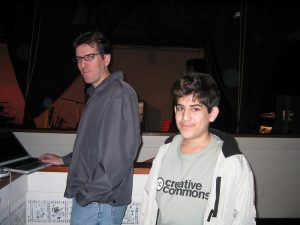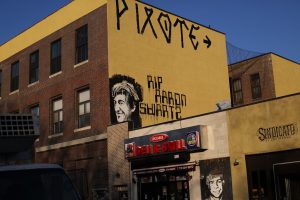This post is also available in: Català (Catalan) Español (Spanish)
What do the Markdown language, RSS, Reddit or the world’s largest catalog of books, Open Library, have in common?
In 2012 several organizations linked to the digital rights movements in the US turned to social networks to fight against the Stop Online Piracy Act (SOPA). This bill sought to expand the powers of copyright with the excuse of fighting piracy; censoring internet access and violating freedom of expression. In the midst of this great show of strength in the fight for online freedom, one person stood out for his discourse: Aaron Swartz.
Aaron Swartz had made the headlines a few months earlier for being accused of downloading, and allegedly publishing, a large number of privately accessible academic papers from the JSTOR platform, managed by the MIT.
But who was Aaron?

Aaron was born near Chicago in 1986 and from a very young age showed great learning skills, mostly focused on reading and computer programming. He grew up with the creation of the Internet as we know it today, and this relationship would keep him bound to it all his life.
At the age of 15 he collaborated in the definition of the RSS protocol, the language used by web pages to share updates with applications, such as new episodes in a podcast player or news syndicated by an aggregator like Mozilla Thunderbird.
At 18 he collaborated in the creation of the Markdown language, a syntax widely used in the world of code documentation that makes it easy to write and publish later in HTML formats, adopted by platforms such as GitHub, GitLab and other scientific documentation environments.
At the age of 19 he created the Reddit platform, a collaborative community portal that allowed, and still does now, sharing knowledge, doubts, proposals… and that popularized the use of voting on the answers to make them more or less visible within the community. Portals like Meneame, better known in Spain, adopted this policy to build a community news space.
During those years, Aaron discovered that the Internet he dreamed of, a tool for the democratization of knowledge, free and open, was increasingly privatized, and it was up to its users to fight to take care of it.
At that time he met Lawrence Lessig, with whom he collaborated in the creation of Creative Commons, the organization that manages and defines a more open licensing model for sharing culture. And under the shelter of the Guerilla Open Access collective, he began to claim and act against injustices in the net.

This is how he is presented to us in 2012, accused of fraud, with a possible sentence in which he would have to face 35 years in prison, followed by three more years of probation. And Aaron, until the very last moment, denied all the accusations.
Under this situation of public pressure and several failed plea deals to close the case, Aaron died in his apartment on January 11, 2013, aged 23, by hanging.
Aaron’s struggle is not the only one and his conviction reinforced a new type of activism called hacktivism. His death was caused by a judicial system that works hand in hand with the copyright business and an academic system that generates profit by keeping knowledge under lock and key.
What would Aaron think of our current Internet ? It is up to us to make this change.
As he said in the Guerrilla Open Access manifesto: “There is no justice in following unfair laws”.
Related links:
Featured photo: “Aaron Swartz” by Maria Jesus V is licensed under CC BY 2.0.
